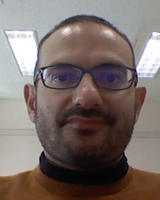
Michele Dall'Arno
| Affiliation | Department of Computer Science and Engineering |
|---|---|
| Title | Associate professor |
| Fields of Research | Quantum information |
| dallarno@cs Please append ".tut.ac.jp" to the end of the address above. |
|
| Researcher information URL(researchmap) | Researcher information |
Research
Many operational setups can be conveniently described by a circuital model. Whenever an input is provided, the circuit converts it into some sort of information, that is then processed according to some rules and finally converted back to produce an output. However, classical information theory does not suffice for an adequate description of the way such a circuit internally represents and processes information, and one has to resort to its quantum counterpart. Our research spans such a theory of quantum information.Theme1:Quantum communication and information retrieval
Overview
Our research topics include quantum communication and information-retrieval problems, such as the minimization of the error or the energy in the readout of quantum bits. We study both the single shot case (quantum hypothesis testing, utility of quantum channels, guesswork of quantum ensembles, quantum reading of unitary devices), as well as the asymptotic regime (quantum channel capacities, accessible information of quantum ensembles, informational power of quantum measurements).
Theme2:Quantum circuit characterization
Overview
We investigate the problem of characterizing quantum circuits with machine-learning-like approaches solely based on input-output correlations, such as device-independent tests and data-driven inference, with applications for instance in the reliable calibration of quantum computers. In conjunction with the derivation of simulability criteria for quantum circuits, such a characterization aims at a device-independent formulation of the resource theories of quantum circuits.
Theme3:Higher order quantum circuits
Overview
Our research lines include quantum combs, that is, quantum circuits that have other circuits as their input and output. For instance, we investigate the problem of the controllability of quantum circuits, that is, the quantum equivalent of the ”if-then” conditional construct of classical programming languages, for the implementation of algorithms for quantum computation.

